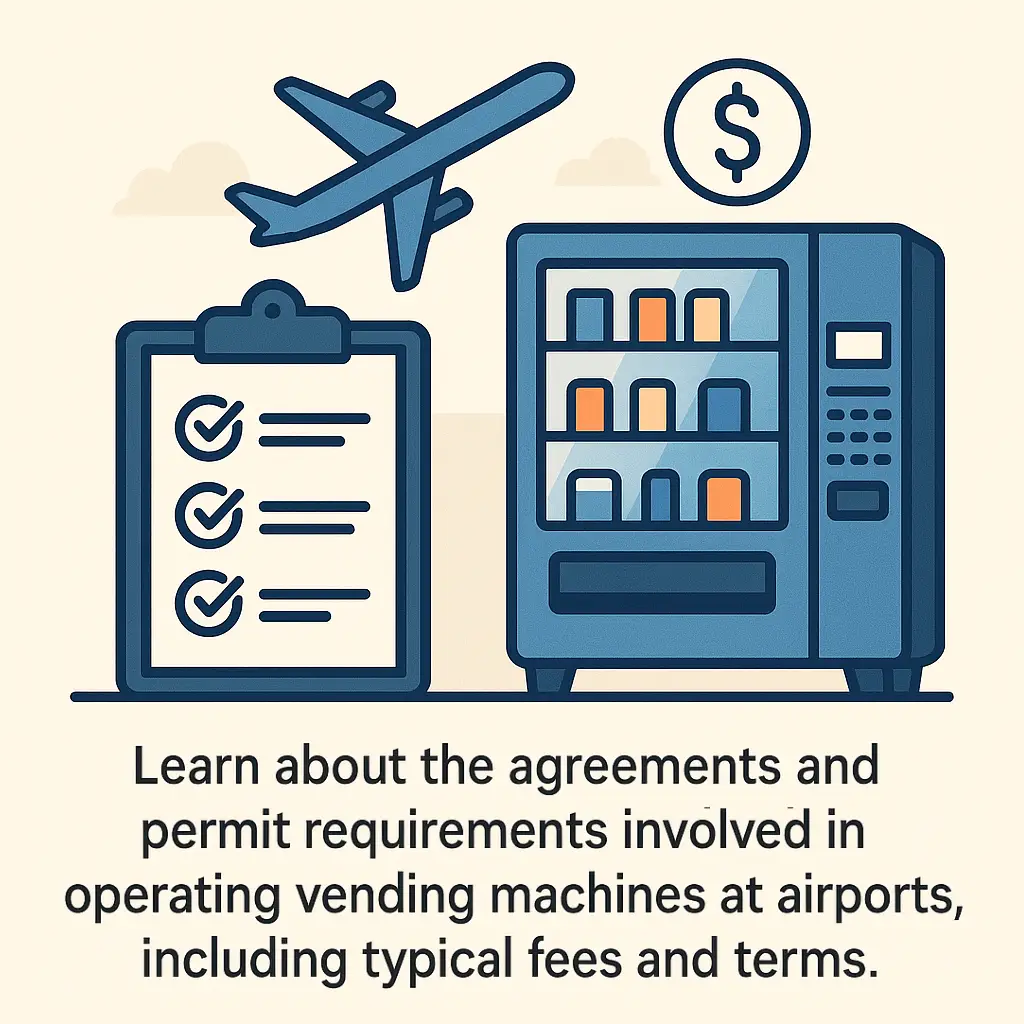Understanding Airport Vending Contracts and Permits
Learn about the agreements and permit requirements involved in operating vending machines at airports, including typical fees and terms.
Back to Vending for Airports ResourcesLearn about the agreements and permit requirements involved in operating vending machines at airports, including typical fees and terms.
Back to Vending for Airports ResourcesAirport vending requires contracts, permits, and compliance with regulations to operate smoothly and avoid delays.
![]() Understand key contract terms before bidding for placements
Understand key contract terms before bidding for placements
![]() Learn permit requirements to avoid delays and rejections
Learn permit requirements to avoid delays and rejections
![]() Know fees and standards to budget accurately
Know fees and standards to budget accurately

Airport vending involves more than placing a machine in a busy terminal. Operators must navigate a structured system of contracts, permits, and regulatory approvals to secure placement. Understanding these legal and procedural steps is essential to maintaining compliance while ensuring smooth operations.
Most airport vending agreements outline placement duration, service expectations, and financial obligations. These contracts are typically awarded through competitive bidding or concessions programs, which prioritize reliability and alignment with airport policies. Common terms include commission rates based on sales, exclusivity clauses for specific terminals or product types, and rules governing branding and machine appearance. Contracts may also stipulate service response times and restocking frequency to ensure travelers always have access to stocked, functional machines.
Before installation, operators must obtain the appropriate permits from the airport authority or facilities department. These permits usually require proof of insurance, background checks, and security clearance for staff entering restricted areas. Processing times vary but can take several weeks. Understanding these timelines is crucial when planning installation to avoid delays.
Airports often charge permit or concession fees, either as a flat rate or as a percentage of sales. Some locations bundle fees into the contract’s commission structure, while others separate operational costs from revenue sharing. These fees support airport infrastructure and help fund terminal maintenance. Knowing these costs upfront helps operators budget more accurately and avoid unexpected expenses.
Airports hold vending operations to strict standards. Machines must meet electrical and safety codes, support cashless payments, and comply with accessibility regulations. Regular inspections ensure machines remain in good working order and stocked appropriately. Non-compliance can result in penalties or termination of contracts, making adherence to airport policies non-negotiable.
Careful planning is necessary to secure desirable locations within an airport. Reviewing concession program details and previous contract awards can provide valuable insights. Building a timeline that factors in security clearances, permit processing, and machine preparation helps streamline setup. For additional insights, explore topics like airport placement strategies and security and monitoring approaches. It’s also helpful to review cashless payment options for international travelers to meet passenger expectations.
If you're exploring vending options for your business, Vending Exchange can help simplify the process. Delivery, Installation and Equipment is provided at no cost to you - vendors provide the machines, keep them stocked, and handle all servicing. Whether you need a provider or full-service management, just fill out the form on this page to get started.
Most agreements cover placement length, service standards, commission rates, branding rules, and restocking requirements.
Yes, permits are often needed from the airport authority, including insurance proof and background checks.
Approval can take several weeks due to security clearances and administrative processing times.
Airports often charge concession or permit fees, either flat or based on sales percentages.
Yes, machines must meet safety codes, accessibility rules, and support modern payment methods.
Yes, failure to meet service or regulatory standards can result in penalties or contract termination.
Some agreements grant exclusivity for product categories or locations within the airport.
Yes, staff accessing secure areas typically need background checks and security clearance.
They factor in permit processing, machine preparation, and security approvals to avoid delays.
It ensures compliance, helps avoid costly mistakes, and supports smooth airport operations.